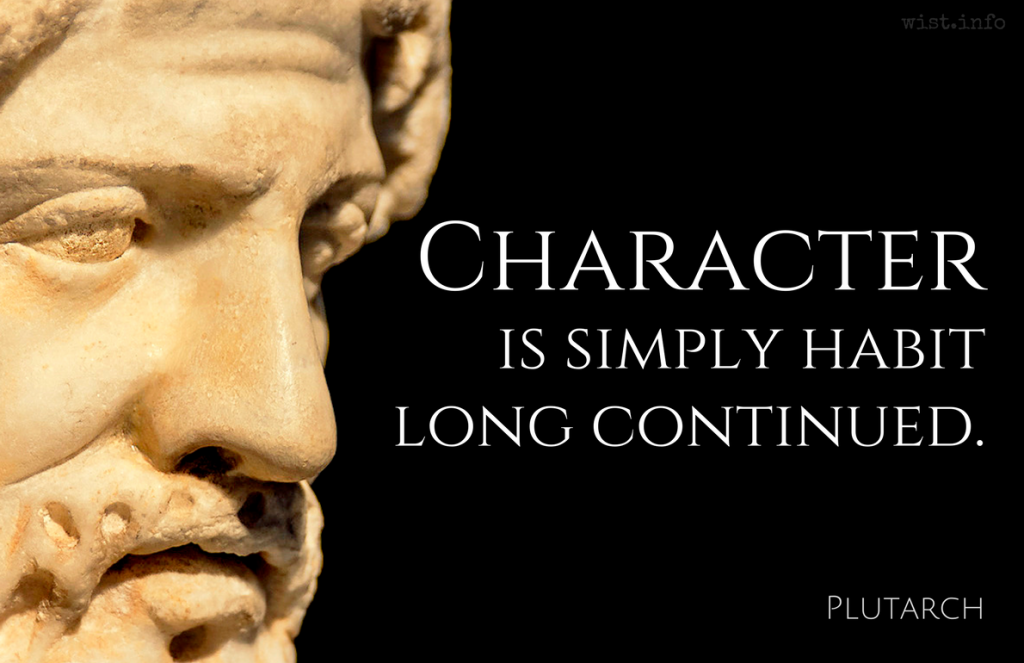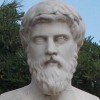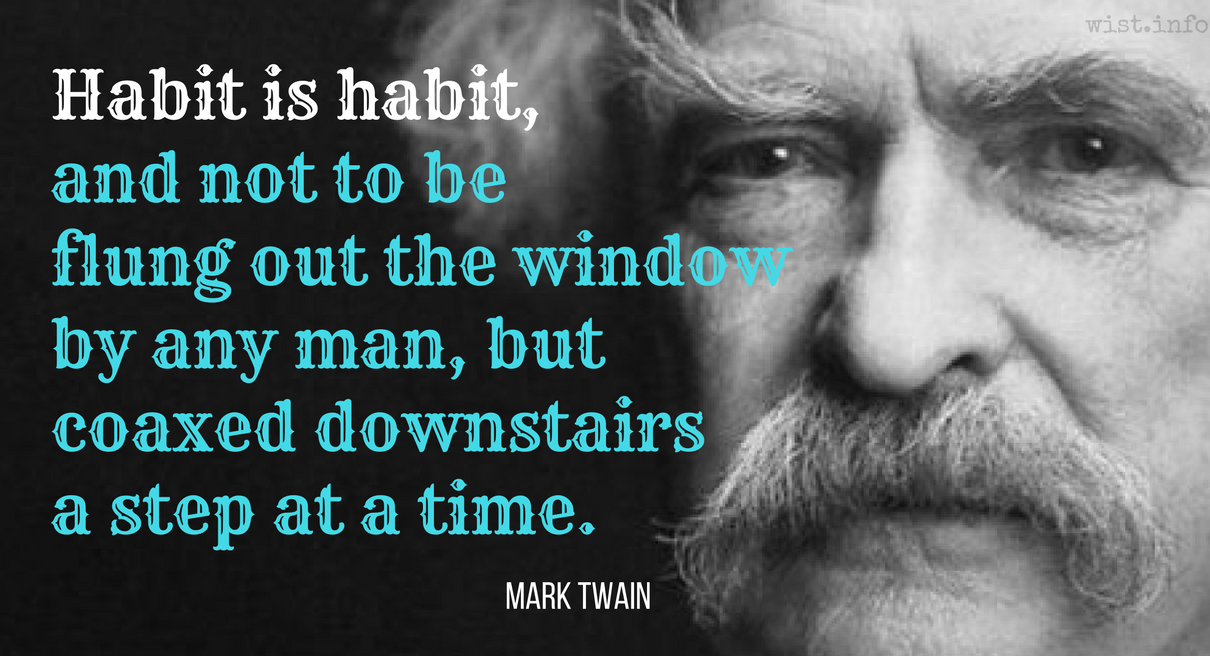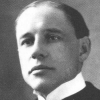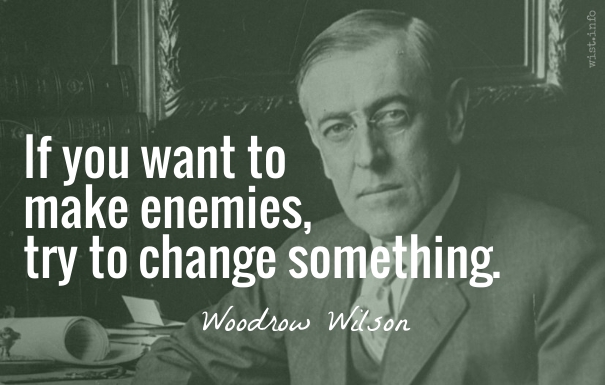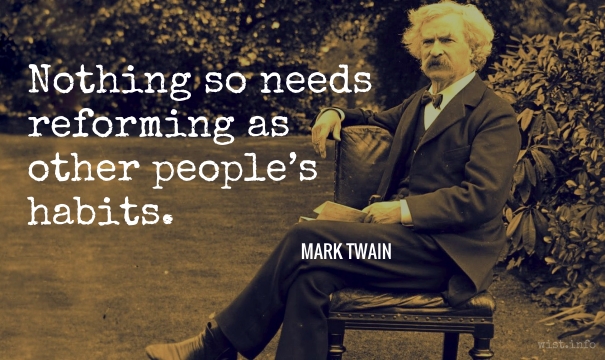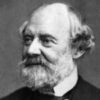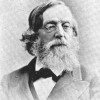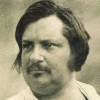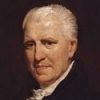Vices are more frequently habits than they are passions.
[Les vices sont plus souvent des habitudes que des passions.]
Nicolas Chamfort (1741-1794) French writer, epigrammist (b. Nicolas-Sébastien Roch)
Unanthologized Aphorism, ¶ 21
(Source)
(Source (French)).
Apothegm # 43 used by Mirabeau in his 1785 letters (Mirabeau's Letters During His Residence in England, Vol. 2 (1832)), but taken originally from Chamfort, as found in the third Appendix of the Claude Arnaud's biography Chamfort (1988).
Quotations about:
habit
Note not all quotations have been tagged, so Search may find additional quotes on this topic.
So strong is custom formed in early years.
[Adeo in teneris consuescere multum est.]
Virgil (70-19 BC) Roman poet [b. Publius Vergilius Maro; also Vergil]
Georgics [Georgica], Book 2, l. 272ff (2.272) (29 BC) [tr. Greenough (1900)]
(Source)
Discussing how, when transplanting vines, wise farmers try to match the soil and orientation of the plant toward the sun to the conditions where they first sprouted. The same phrase is often extended (when extracted like this) to the lasting effects of early training on children. See also Pope.
(Source (Latin)). Alternate translations:
Such strength hath custome in each tender soule.
[tr. Ogilby (1649)]
So strong is Custom; such Effects can Use
In tender Souls of pliant Plants produce.
[tr. Dryden (1709), ll. 366-367]
So strong is habit's force in tender age.
[tr. Nevile (1767), l. 302]
So custom strongly sways the youthful year.
[tr. Sotheby (1800)]
Of such avail is custom in tender years.
[tr. Davidson (1854)]
So custom lords it o'er the youthful wood.
[tr. Blackmore (1871), l. 324]
Such is the force of habits formed in early years.
[tr. Wilkins (1873)]
So strong is custom formed in early years.
[tr. Rhoades (1881)]
So powerful is habit in things of tender age.
[tr. Bryce (1897)]
So strong is the habit of infancy.
[tr. Mackail (1899)]
So potent is early habit's control.
[tr. Way (1912)]
So loth to change
Are a young creature's ways.
[tr. Williams (1915)]
So strong is habit in tender years.
[tr. Fairclough (Loeb) (1916)]
So important are habits developed in early days.
[tr. Day-Lewis (1940)]
For habit dominates the early stage.
[tr. Bovie (1956)]
So much effect has habit on the young.
[tr. Wilkinson (1982)]
We grow accustomed to so much in tender years.
[tr. Kline (2001)]
How powerful the innate habits of tender plants!
[tr. Lembke (2004)]
So powerfully runs habit in the tender stems.
[tr. Johnson (2009)]
Such is the need, when young, of what's familiar.
[tr. Ferry (2015)]
He that avoideth not small faults, by little and little falleth into greater.
[Qui parvos non devitat defectus, paulatim labitur ad majora.]
Thomas à Kempis (c. 1380-1471) German-Dutch priest, author
The Imitation of Christ [De Imitatione Christi], Book 1, ch. 25, v. 10 (1.25.10) (c. 1418-27) [tr. Anon. (1901)]
(Source)
Cross-referenced in some sources to Ecclesiasticus (Sirach) 19:1 -- "One who despises small things will fail little by little."
(Source (Latin)). Alternate translations:
He that will not flee small sins, shall by little and little fall into greater.
[tr. Whitford/Raynal (1530/1871)]
He who will not flee small sins will, by little and little, fall into greater sins.
[tr. Whitford/Gardner (1530/1955)]
He that avoideth not small slips, by litle and litle may take a great fall.
[tr. Page (1639), 1.25.39]
He who does not inure himself to vanquishing by subduing less temptations, will never be able to grapple with more violent and trying ones; and infirmities once yielded to, grow insensibly to stubborn habits of vice.
[tr. Stanhope (1696; 1809 ed.), "The Christian's Pattern"]
He who is not careful to resist and subdue small sins, will insensibly fall into greater.
[tr. Payne (1803), 1.25.12]
He that avoideth not small faults, by little and little falleth into greater.
[ed. Parker (1841)]
He who is not careful to resist small sins, will insensibly fall into greater.
[tr. Dibdin (1851)]
He that does not shun small defects, by little and little falls into greater.
[ed. Bagster (1860)]
He who shunneth not small faults falleth little by little into greater.
[tr. Benham (1874)]
He who does not overcome small faults, shall fall little by little into greater ones.
[tr. Croft/Bolton (1940)]
He who does not try to shun small faults slips little and little into greater ones.
[tr. Daplyn (1952)]
The man who doesn't keep clear of petty faults will gradually slip into graver ones.
[tr. Knox-Oakley (1959)]
The man who does not avoid small failings gradually drifts into greater ones.
[tr. Knott (1962)]
If you do not avoid small faults, you will soon commit greater ones.
[tr. Rooney (1979)]
The person who does not avoid small faults, little by little slips into greater ones.
[tr. Creasy (1989)]
If by the age of forty a man is still disliked there is no hope for him.
[年四十而見惡焉、其終也已。]
Confucius (c. 551- c. 479 BC) Chinese philosopher, sage, politician [孔夫子 (Kǒng Fūzǐ, K'ung Fu-tzu, K'ung Fu Tse), 孔子 (Kǒngzǐ, Chungni), 孔丘 (Kǒng Qiū, K'ung Ch'iu)]
The Analects [論語, 论语, Lúnyǔ], Book 17, verse 26 (17.26) (6th C. BC – AD 3rd C.) [tr. Lau (1979)]
(Source)
(Source (Chinese)). Alternate translations:
When a man at forty is the object of dislike, he will always continue what he is.
[tr. Legge (1861)]
When a man meets with odium at forty, he will do so to the end.
[tr. Jennings (1895)]
If a man after forty is an object of dislike to men, he will continue to be so to the end of his days.
[tr. Ku Hung-Ming (1898)]
If a man reach forty and yet be disliked by his fellows, he will be so to the end.
[tr. Soothill (1910)]
Forty and disliked. He is at the end already; too late to alter.
[tr. Soothill (1910) - alternate 1]
At 40 a man's character is settled, and if he still be detested by his fellows, then here his end is reached.
[tr. Soothill (1910) - alternate 2]
If a man is hateful at forty he'll be so to the end.
[tr. Pound (1933)]
One who has reached the age of forty and is still disliked will be so till the end.
[tr. Waley (1938)]
It is all over for the man of forty who is held in aversion.
[tr. Ware (1950), 17.24]
If hateful things are seen in one at the age of forty, that is indeed how one will end up.
[tr. Dawson (1993)]
Whoever, by the age of forty, is still disliked, will remain so till the end.
[tr. Leys (1997)]
If, at forty, a man is still loathed, he is done for.
[tr. Huang (1997), 17.25]
If one is still disliked at his forty years of age, one is going to the end.
[tr. Cai/Yu (1998), No. 466]
The person who at age forty still evokes the dislike of others is a hopeless case.
[tr. Ames/Rosemont (1998)]
If he is forty and is still hated, he will probably be so until the end.
[tr. Brooks/Brooks (1998), 17.24]
If you reach forty and find it all hateful, you'll be that way to the death.
[tr. Hinton (1998), 17.25]
If, having reached the age of forty, you still find yourself despised by others, you will remain despised until the end of your days.
[tr. Slingerland (2003)]
Forty and hated by others -- and he’ll be so the rest of his life.
[tr. Watson (2007)]
If a person has reached forty but is still an outcast, he will not have much hope for the rest of his life.
[tr. Li (2020)]
JUBA: Beauty soon grows familiar to the lover,
Fades in his eye, and palls upon the sense.
In a word, our moral dispositions are formed as a result of the corresponding activities. Hence it is incumbent on us to control the character of our activities, since on the quality of these depends the quality of our dispositions. It is therefore not of small moment whether we are trained from childhood in one set of habits or another; on the contrary it is of very great, or rather of supreme, importance.
[καὶ ἑνὶ δὴ λόγῳ ἐκ τῶν ὁμοίων ἐνεργειῶν αἱ ἕξεις γίνονται. διὸ δεῖ τὰς ἐνεργείας ποιὰς ἀποδιδόναι: κατὰ γὰρ τὰς τούτων διαφορὰς ἀκολουθοῦσιν αἱ ἕξεις. οὐ μικρὸν οὖν διαφέρει τὸ οὕτως ἢ οὕτως εὐθὺς ἐκ νέων ἐθίζεσθαι, ἀλλὰ πάμπολυ, μᾶλλον δὲ τὸ πᾶν.]
Aristotle (384-322 BC) Greek philosopher
Nicomachean Ethics [Ἠθικὰ Νικομάχεια], Book 2, ch. 1 (2.1, 1103b.20ff) (c. 325 BC) [tr. Rackham (1934), sec. 7-8]
(Source)
(Source (Greek)). Alternate translations:
Or, in one word, the habits are produced from the acts of working like to them: and so what we have to do is to give a certain character to these particular acts, because the habits formed correspond to the differences of these. So then, whether we are accustomed this way or that straight from childhood, makes not a small but an important difference, or rather I would say it makes all the difference.
[tr. Chase (1847)]
And indeed, in a word, all habits are formed by acts of like nature to themselves. And hence it becomes our duty to see that our acts are of a right character. For, as our acts vary, our habits will follow in their course. It makes no little difference, then, to what kind of habituation we are subjected from our youth up; but it is, on the contrary, a matter that is important to us, or rather all-important.
[tr. Williams (1869), sec. 24]
In a word moral states are the results of activities corresponding to the moral states themselves. It is our duty therefore to give a certain character to the activities, as the moral states depend upon the differences of the activities. Accordingly, the difference between one training of the habits and another from early days is not a light matter, but is serious or rather all-important.
[tr. Welldon (1892)]
In a word, acts of any kind produce habits or characters of the same kind. Hence we ought to make sure that our acts be of a certain kind; for the resulting character varies as they vary. It makes no small difference, therefore, whether a man be trained from his youth up in this way or in that, but a great difference, or rather all the difference.
[tr. Peters (1893)]
Thus, in one word, states of character arise out of like activities. This is why the activities we exhibit must be of a certain kind; it is because the states of character correspond to the differences between these. It makes no small difference, then, whether we form habits of one kind or of another from our very youth; it makes a very great difference, or rather all the difference.
[tr. Ross (1908)]
In a word, then, states come about from activities that are similar to them. That is why the activities must exhibit a certain quality, since the states follow along in accord with the differences between these. So it makes no small difference whether people are habituated in one way or in another way straight from childhood; on the contrary, it makes a huge one -- or rather, all the difference.
[tr. Reeve (1948)]
In short, it is by similar activities that habits are developed in men; and in view of this, the activities in which men are engaged should be of [the right] quality, for the kinds of habits which develop follow the corresponding differences in these activities. So in acquiring habit it makes no small difference whether we are acting in one way or on the contrary way right from our early youth; it makes a great difference, or rather all the difference.
[tr. Apostle (1975)]
In a word, then, like activities produce like dispositions. Hence we must give our activities a certain quality, because it is their characteristics that determine the resulting dispositions. So it is a matter of no little importance what sort of habits we form from the earliest age -- it makes a vast difference, or rather all the difference in the world.
[tr. Thomson/Tredennick (1976)]
In a word, then, like states arise from like activities. This is why we must give a certain character to our activities, since it is on the differences between them that the resulting states depend. So it is not unimportant how we are habituated from our early days; indeed it makes a huge difference -- or rather all the difference.
[tr. Crisp (2000)]
And so, in a word, the characteristics come into being as a result of the activities akin to them. Hence we must make our activities be of a certain quality, for the characteristics correspond to the differences among the activities. It makes no small difference, then, whether one is habituated to this or that way straight from childhood but a very great difference -- or rather the whole difference.
[tr. Bartlett/Collins (2011)]
Habit is stronger than reason.
George Santayana (1863-1952) Spanish-American poet and philosopher [Jorge Agustín Nicolás Ruíz de Santayana y Borrás]
Interpretations of Poetry and Religion, ch. 9 (1900)
(Source)
Old women will often bear the lack of food for two or three days. But take food from an athlete for a single day, he will implore the very Olympian Jupiter for whose honor he is in training, and will cry that he cannot bear it. Great is the power of habit.
[Aniculae saepe inediam biduum aut triduum ferunt; subduc cibum unum diem athletae: Iovem, Iovem Olympium, eum ipsum, cui se exercebit, implorabit, ferre non posse clamabit.]
Marcus Tullius Cicero (106-43 BC) Roman orator, statesman, philosopher
Tusculan Disputations [Tusculanae Disputationes], Book 2, ch. 17 (2.17) / sec. 40 (45 BC) [tr. Peabody (1886)]
(Source)
Original Latin. Alternate translations:
Weak old Women oftentimes go without eating two or three days together; do but with-hold Meat one day from a Wrestler, he will cry out upon Olympian Jupiter; the same to whose Honor he shall exercise himself. He will cry he cannot bear it. Great is the Power of Custom.
[tr. Wase (1643)]
You may often hear of diminutive old women living without victuals three or four days; but take away a wrestler's provision for but one day, he will implore Jupiter Olympus, the very god for whom he exercises himself: he will cry out, It is intolerable. Great is the force of custom!
[tr. Main (1824)]
Tender old women often support a fast of two or three days. Withdraw his rations for one day from a wrestler; he will appeal to that Olympic Jove himself, for whom he exercises; he will cry out it impossible to bear it. Great is the force of habit.
[tr. Otis (1839)]
You may often hear of old women living without victuals for three or four days: but take away a wrestler's provisions but for one day, and he will implore the aid of Jupiter Olympius, the very God for whom he exercises himself: he will cry out that he cannot endure it. Great is the force of custom!
[tr. Yonge (1853)]
Feeble old women often endure hunger for two or three days. Take food away from an athlete for just one day. He will appeal to Jupiter, that Olympian Jupiter, the very one for whom he will be doing this training -- he will cry out that he can't bear it. Practice has great power.
[tr. Douglas (1990)]
Little old ladies often bear a two or three day period of fasting; but take away an athlete’s food for a day, and he will beg for relief from Jove! Olympian Jove, the one for whom he exercises! And he’ll tell you that he simply cannot bear it.
[tr. @sentantiq (2015)]
Old women regularly endure a lack of food for a period of three or four days; take from an athlete his food for a single day and he will appeal to olympian Jupiter, the very god in whose honor he trains, he will cry out that he can't bear it. The force of habit is considerable.
[tr. Davie (2017)]
Such as are your habitual thoughts, such also will be the character of your mind; for the soul becomes dyed with the color of its thoughts.
Marcus Aurelius (AD 121-180) Roman emperor (161-180), Stoic philosopher
Meditations, Book 5, #16
Alt. trans.:
- "Your mind will be like its habitual thoughts; for the soul becomes dyed with the color of its thoughts."
- "Whatever kind of impressions you receive most often, so too will be your mind, for the soul is dyed with the color of one's impressions." [tr. Needleman & Piazza (2008)]
- "Your manners will depend very much upon the quality of what you frequently think on; for the soul is as it were tinged with the color and complexion of thought." [tr. Collier (1887)]
The last clause is also frequently attributed to William Ralph Inge, who likely used it in an essay.
I believe that you can reach the point where there is no longer any difference between developing the habit of pretending to believe and developing the habit of believing.
Character is simply habit long continued.
Plutarch (AD 46-127) Greek historian, biographer, essayist [Mestrius Plutarchos]
Moral Writings [Moralia], “On the Education of Children,” 4.3 [tr. Babbitt and Goodwin]
(Source)
Habit is habit, and not to be flung out the window by any man, but coaxed downstairs a step at a time.
Mark Twain (1835-1910) American writer [pseud. of Samuel Clemens]
The Tragedy of Pudd’nhead Wilson, ch. 6, Epigraph “Pudd’nhead Wilson’s Calendar” (1894)
(Source)
The power to become habituated to his surroundings is a marked characteristic of mankind.
John Maynard Keynes (1883-1946) English economist
The Economic Consequences of the Peace, ch. 1 (1919)
(Source)
We call ourselves a liberal nation, whereas, as a matter of fact, we are one of the most conservative nations in the world. If you want to make enemies, try to change something. You know why it is. To do things to-day exactly the way you did them yesterday saves thinking. It does not cost you anything. You have acquired the habit; you know the routine; you do not have to plan anything, and it frightens you with a hint of exertion to learn that you will have to do it a different way to-morrow.
Woodrow Wilson (1856-1924) US President (1913-20), educator, political scientist
“The Democracy of Business,” speech, Salesmanship Congress, Detroit (1916-07-10)
(Source)
Usually trimmed down to just: "If you want to make enemies, try to change something."
Keep your thoughts positive because your thoughts become your words.
Keep your words positive because your words become your behavior.
Keep your behavior positive because your behavior becomes your habits.
Keep your habits positive because your habits become your values.
Keep your values positive because your values become your destiny.
Sow an act, and you reap a habit. Sow a habit, and you reap a character. Sow a character, and you reap a destiny.
Charles Reade (1814-1884) English novelist and dramatist
(Attributed)
Attributed in Notes and Queries, 9th series, vol. 12 (7 Nov 1903). Not found in any of his works, but attributed to many other authors over time. See here for more discussion.
In short, we can judge by nothing but Appearances, and they are very apt to deceive us. Some put on a gay chearful Outside, and appear to the World perfectly at Ease, tho’ even then, some inward Sting, some secret Pain imbitters all their Joys, and makes the Balance even: Others appear continually dejected and full of Sorrow; but even Grief itself is sometimes pleasant, and Tears are not always without their Sweetness: Besides, Some take a Satisfaction in being thought unhappy, (as others take a Pride in being thought humble,) these will paint their Misfortunes to others in the strongest Colours, and leave no Means unus’d to make you think them thoroughly miserable; so great a Pleasure it is to them to be pitied; Others retain the Form and outside Shew of Sorrow, long after the Thing itself, with its Cause, is remov’d from the Mind; it is a Habit they have acquir’d and cannot leave.
Benjamin Franklin (1706-1790) American statesman, scientist, philosopher, aphorist
“A Dissertation on Liberty and Necessity” (1725)
(Source)
We must be something in order to do something, but we must also do something in order to be something. The best rule, I think, is this: If we find it hard to do good, then let us try to be good. If, on the other hand, we find it hard to be good, then let us try to do good. Being leads to doing, doing leads to being. Yet below both as their common root is faith, — faith in God, in man, in ourselves, in the eternal superiority of right over wrong, truth over error, good over evil, love over all selfishness and all sin.
There is a popular hallucination that makes of authors a romantic people who are entirely dependent upon moods and moments of inspiration for the power to labor in their peculiar way. Authors are supposed to write when they “feel like it,” and at no other time. Visions of Byron with a gin-bottle at his side, and a beautiful woman hanging over his shoulder, dashing off a dozen stanzas of Childe Harold at a sitting, flit through the brains of sentimental youth. We hear of women who are seized suddenly by an idea, as if it were a colic, or a flea, often at midnight, and are obliged to rise and dispose of it in some way. We are told of very delicate girls who carry pencils and cards with them, to take the names and address of such angels as may visit them in out-of-the-way places. We read of poets who go on long sprees, and after recovery retire to their rooms and work night and day, eating not and sleeping little, and in some miraculous way producing wonderful literary creations. The mind of a literary man is supposed to be like a shallow summer brook, that turns a mill. There is no water except when it rains, and the weather being very fickle, it is never known when there will be water. Sometimes, however, there comes a freshet, and then the mill runs night and day, until the water subsides, and another dry time comes on.
Now, while I am aware, as every writer must be, that the brain works very much better at some times than it does at others, I can declare without reservation, that no man who depends upon moods for the power to write can possibly accomplish much. I know men who rely upon their moods, alike for the disposition and the ability to write, but they are, without exception, lazy and inefficient men. They never have accomplished much, and they never will accomplish much.
J. G. Holland (1819-1881) American novelist, poet, editor [Josiah Gilbert Holland; pseud. Timothy Titcomb]
Lessons in Life, Lesson 1 “Moods and Frames of Mind” (1861) [as Timothy Titcomb]
(Source)
Discipline should not be practiced like a rule imposed on oneself from the outside, but that it becomes an expression of one’s own will; that it is felt as pleasant, and that one slowly accustoms oneself to a kind of behavior which one would eventually miss, if one stopped practicing it.
If you would not be of an angry temper, then, do not feed the habit. Give it nothing to help it increase. Be quiet at first and reckon the days in which you have not been angry. I used to be angry every day; now every other day; then every third and fourth day; and if you miss it so long as thirty days, offer a of Thanksgiving to God. For habit is first weakened and then entirely destroyed.
The enemy held my will in his power and from it he had made a chain and shackled me. My will was perverse and lust had grown from it, and when I gave in to lust habit was born, and when I did not resist the habit it became a necessity. These were the links which together formed what I have called my chain, and it held me fast in the duress of servitude.
[Velle meum tenebat inimicus et inde mihi catenam fecerat et constrinxerat me. Quippe ex voluntate perversa facta est libido, et dum servitur libidini, facta est consuetudo, et dum consuetudini non resistitur, facta est necessitas. Quibus quasi ansulis sibimet innexis (unde catenam appellavi) tenebat me obstrictum dura servitus.]
Augustine of Hippo (354-430) Christian church father, philosopher, saint [b. Aurelius Augustinus]
Confessions, Book 8, ch. 5 / ¶ 10 (8.5.10) (c. AD 398) [tr. Pine-Coffin (1961)]
(Source)
Sometimes paraphrased "Habit, if not resisted, soon becomes necessity."
(Source (Latin)). Alternate translations:
My will the enemy held, and thence had made a chain for me, and bound me. For of a forward will, was a lust made; and a lust served, became custom; and custom not resisted, became necessity. By which links, as it were, joined together (whence I called it a chain) a hard bondage held me enthralled.
[tr. Pusey (1838), and ed. Shedd (1860)]
My will was the enemy master of, and thence had made a chain for me and bound me. Because of a perverse will was lust made; and lust indulged in became custom; and custom not resisted became necessity. By which links, as it were, joined together (whence I term it a “chain”), did a hard bondage hold me enthralled.
[tr. Pilkington (1876)]
The enemy held my will , and with me made a chain for me and bound me. For from a perverse will, lust was made; and in obeying lust, habit was formed, and habit not resisted, became necessity. By which links, as it were, joined together -- therefore I call it a chain -- was I held shackled with a hard bondage.
[tr. Hutchings (1890)]
The enemy held fast my will, and had made of it a chain, and bound me tight therewith. For from a perverse will came lust, and the service of lust ended in habit, and acquiescence in habit produced necessity. These were the links of what I call my chain, and they held me bound in hard slavery.
[tr. Bigg (1897)]
The enemy held my will; and of it he made a chain and bound me. Because my will was perverse it changed to lust, and lust yielded to became habit, and habit not resisted became necessity. These were like links hanging one on another -- which is why I have called it a chain -- and their hard bondage held me bound hand and foot.
[tr. Sheed (1943)]
The enemy held fast my will, and had made of it a chain, and had bound me tight with it. For out of the perverse will came lust, and the service of lust ended in habit, and habit, not resisted, became necessity. By these links, as it were, forged together--which is why I called it “a chain”--a hard bondage held me in slavery.
[tr. Outler (1955)]
The enemy had control of my will, and out of it he fashioned a chain and fettered me with it. For in truth lust is made out of a perverse will, and when lust is served, it becomes habit, and when habit is not resisted, it becomes necessity. By such links, joined one to another, as it were -- for this reason I have called it a chain -- a harsh bondage held me fast.
[tr. Ryan (1960)]
The enemy held my will and made a chain out of it and bound me with it. From a perverse will came lust, and slavery to lust became a habit, and the habit, being constantly yielded to, became a necessity. These were like links, hanging each to each (which is why I called it a chain), and they held me fast in a hard slavery.
[tr. Warner (1963)]
My willingness the enemy held, and out of it had made me a chain and bound me. Of stubborn will ios a lust made. When a lust is served, a custom is made, and when a custom is not resisted a necessity is made. It was as though link was bound to link (hence what I called a chain) and hard bondage held me bound.
[tr. Blailock (1983)]
It is futile to judge a kind deed by its motives. Kindness can become its own motive. We are made kind by being kind.
Eric Hoffer (1902-1983) American writer, philosopher, longshoreman
The Passionate State of Mind, Aphorism 123 (1955)
(Source)
Unless we can extensively program our behavior, we waste tremendous amounts of information-processing capacity on trivia. This is why we form habits. Watch a committee break for lunch and then return to the same room: almost invariably its members seek out the same seats they occupied earlier. … Choosing the same seat spares us the need to survey and evaluate other possibilities.
Virtues, however, we acquire by first exercising them. The same is true with skills, since what we need to learn before doing, we learn by doing; for example, we become builders by building, and lyre-players by playing the lyre. So too we become just by doing just actions, temperate by temperate actions, and courageous by courageous actions.
[τὰς δ’ ἀρετὰς λαμβάνομεν ἐνεργήσαντες πρότερον, ὥσπερ καὶ ἐπὶ τῶν ἄλλων τεχνῶν· ἃ γὰρ δεῖ μαθόντας ποιεῖν, ταῦτα ποιοῦντες μανθάνομεν, οἷον οἰκοδομοῦντες οἰκοδόμοι γίνονται καὶ κιθαρίζοντες κιθαρισταί· οὕτω δὴ καὶ τὰ μὲν δίκαια πράττοντες δίκαιοι γινόμεθα, τὰ δὲ σώφρονα σώφρονες, τὰ δ’ ἀνδρεῖα ἀνδρεῖοι.]
Aristotle (384-322 BC) Greek philosopher
Nicomachean Ethics [Ἠθικὰ Νικομάχεια], Book 2, ch. 1 (2.1, 1103a.32ff) (c. 325 BC) [tr. Crisp (2000)]
(Source)
(Source (Greek)). Alternate translations:
But the Virtues we get by first performing single acts of working, which, again, is the case of other things, as the arts for instance; for what we have to make when we have learned how, these we learn how to make by making: men come to be builders, for instance, by building; harp-players, by playing on the harp: exactly so, by doing just actions we come to be just; by doing the actions of self-mastery we come to be perfected in self-mastery; and by doing brave actions brave.
[tr. Chase (1847)]
But the virtues we acquire by previous practice of their acts, exactly as we acquire our knowledge of the various arts. For, in the case of the arts, that which we have to be taught to do, that we learn by doing it. We become masons, for instance, by building; and harpers b y playing upon the harp. And so, in like manner, we become just by doing what is just, temperate by doing what is temperate, and brave by doing what is brave.
[tr. Williams (1869), sec. 23]
But the virtues we acquire by first exercising them, as is the case with all the arts, for it is by doing what we ought to do when we have learnt the arts that we learn the arts themselves; we become e.g. builders by building and harpists by playing the harp. Similarly it is by doing just acts that we become just, by doing temperate acts that we become temperate, by doing courageous acts that we become courageous.
[tr. Welldon (1892)]
But the virtues we acquire by doing the acts, as is the case with the arts too. We learn an art by doing that which we wish to do when we have learned it; we become builders by building, and harpers by harping. And so by doing just acts we become just, and by doing acts of temperance and courage we become temperate and courageous.
[tr. Peters (1893)]
But the virtues we get by first exercising them, as also happens in the case of the arts as well. For the things we have to learn before we can do them, we learn by doing them, e.g. men become builders by building and lyreplayers by playing the lyre; so too we become just by doing just acts, temperate by doing temperate acts, brave by doing brave acts.
[tr. Ross (1908)]
The virtues on the other hand we acquire by first having actually practised them, just as we do the arts. We learn an art or craft by doing the things that we shall have to do when we have learnt it: for instance, men become builders by building houses, harpers by playing on the harp. Similarly we become just by doing just acts, temperate by doing temperate acts, brave by doing brave acts.
[tr. Rackham (1934), ch. 1, sec. 4]
The virtues, by contrast, we acquire by first engaging in the activities, as is also true in the case of the various crafts. For the things we cannot produce without learning to do so are the very ones we learn to produce by producing them -- for example, we become builders by building houses and lyre players by playing the lyre. Similarly, then, we become just people by doing just actions, temperate people by doing temperate actions, and courageous people by doing courageous ones.
[tr. Reeve (1948)]
In the case of the virtues, on the other hand, we acquire them as a result of prior activities; and this is like the case of the arts, for that which we are to perform by art after learning, we first learn by performing, e.g., we become builders by building and lyre-players by playing the lyre. Similarly, we become just by doing what is just, temperate by doing what is temperate, and brave by doing brave deeds.
[tr. Apostle (1975)]
Virtues, by contrast, we acquire, just as we acquire crafts, by having previously activated them. For we learn a craft by producing the same product that we must produce when we have learned it, becoming builders, for instance, by building and harpists by playing the harp, so also, then, we become just by doing just actions, temperate by doing temperate actions, brave by doing brave actions.
[tr. Irwin/Fine (1995)]
For as regards those things we must learn how to do, we learn by doing them -- for example by building houses, people become house builders, and by playing the cithara, they become cithara players. So too, then, by doing just things become just; moderate things, moderate; and courageous things, courageous.
[tr. Bartlett/Collins (2011)]
We develop virtues after we have practiced them beforehand, the same way it works with the other arts. For, we learn as we do those very things we need to do once we have learned the art completely. So, for example, men become carpenters by building homes and lyre-players by practicing the lyre. In the same way, we become just by doing just things, prudent by practicing wisdom, and brave by committing brave deeds.
[tr. @sentantiq (2017)]
The hell to be endured hereafter, of which theology tells, is no worse than the hell we make for ourselves in this world by habitually fashioning our characters in the wrong way. Could the young but realize how soon they will become mere walking bundles of habits, they would give more heed to their conduct while in the plastic state. We are spinning our own fates, good or evil. Every smallest stroke of virtue or of vice leaves its never so little scar.
William James (1842-1910) American psychologist and philosopher
The Principles of Psychology, Vol. 1, ch. 4 “Habit” (1890)
(Source)
This chapter originally published in Popular Science Monthly (Feb 1887).
“When you wake up in the morning, Pooh, what’s the first thing you say to yourself?”
“What’s for breakfast?” said Pooh. “What do you say, Piglet?”
“I say, I wonder what’s going to happen exciting today?” said Piglet.
Pooh nodded thoughtfully.
“It’s the same thing,” he said.
I have not been afraid of excess: excess on occasion is exhilarating. It prevents moderation from acquiring the deadening effect of a habit.
W. Somerset Maugham (1874-1965) English novelist and playwright [William Somerset Maugham]
The Summing Up, ch. 15 (1938)
(Source)
Do something every day that you don’t want to do; this is the golden rule for acquiring the habit of doing your duty without pain.
Mark Twain (1835-1910) American writer [pseud. of Samuel Clemens]
Following the Equator, ch. 58, epigraph (1897)
See here for more discussion about this (and related) quotations.
We are what we repeatedly do. Excellence, therefore, is not an act but a habit.
Aristotle (384-322 BC) Greek philosopher
Nicomachean Ethics [Ἠθικὰ Νικομάχεια] (c. 325 BC) (paraphrase)
(Source)
Variants:Not actually Aristotle, but a summary by Will Durant, The Story of Philosophy: The Lives and Opinions of the World's Greatest Philosophers (1926), ch. 2 "Aristotle and Greek Science," sec. 7 "Ethics and the Nature of Happiness" (1926):
- "We are what we repeatedly do. Excellence, then, is not an act, but a habit."
- "We are what we repeatedly do, therefore excellence is not an act, but a habit."
Excellence is an art won by training and habituation: we do not act rightly because we have virtue or excellence, but we rather have these because we have acted rightly; "these virtues are formed in man by his doing the actions"; we are what we repeatedly do. Excellence, then, is not an act but a habit: "the good of man is a working of the soul in the way of excellence in a complete life ... for as it is not one swallow or one fine day that makes a spring, so it is not one day or a short time that makes a man blessed and happy."
The quoted phrases are from the Nicomachean Ethics, Book 2, ch. 4; Book 1, ch. 7.













